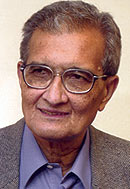
Here below are excerpts from Amartya Sen's Contrary India, which appeared in "The World in 2006".
“The frustrating thing about India”, I was told by one of my teachers, the great Cambridge economist Joan Robinson, “is that whatever you can rightly say about India, the opposite is also true.” This will continue to apply in 2006.
Is India a successful democracy? Certainly. Its multi-party democracy with free elections, free speech and civil liberties has been functioning well, and it has had fine side-results such as the elimination of famines (a frequent occurrence in British India—the last, in 1943, was just four years before independence). But no, it cannot have been entirely successful, since democratic rights have not eliminated undernourishment, ill health and other deprivations. Is the Indian economy doing very well? Yes, it is growing fast and there is a lot of new income around. But poverty is still very grave. Is Indian education a great success? Yes, of course, India has a large, well-educated and highly trained population and it provides skilled labour for academia, for science, for technology, for literature, for music and the fine arts, for administration, for management, for medicine—both within India and across the world. Yet nearly a third of the population is still illiterate.......
Indian commitment to democracy is sometimes attributed simply to the impact of British influence. And yet if that were the primary reason, it would not be clear why such an influence should not have worked similarly for a hundred other countries which also emerged from the same empire on which the sun used not to set.
Democracy is, ultimately, the practice of public reasoning in the broadest sense. Voting is part of a much larger process which includes open public discussion and uncensored criticism. Traditions of public reasoning exist across the world and are not a monopoly of the West or of any other civilisation or culture. But India has been particularly fortunate in having a long and powerful argumentative tradition. Some of the earliest open general meetings in the world aimed specifically at settling disputes, through discussion between holders of different points of view, took place in India, from the sixth century BC onwards, in the series of so-called “Buddhist councils”, where adherents of different points of view gathered together to argue out their differences. Emperor Ashoka, who hosted the largest of these councils in the capital city of Patna in the third century BC, also attempted to codify and promote what must have been among the earliest formulations of rules for public discussion......the first systematic public discussions in the world between holders of different religious views were arranged by the great Moghul emperor Akbar in Agra in the 1590s, at a time when the Inquisitions were still going on in Europe.
Democracy is already doing more in India than is sometimes acknowledged.....There is some significance even in the fact that a country in which more than 80% of the electorate happen to be Hindu has chosen a Sikh prime minister (Manmohan Singh), a Muslim president (Abdul Kalam) and a Christian leader of the ruling Congress party (Sonia Gandhi).
Important as public reasoning, political liberty, civil rights, consolidation of secularism and prevention of disasters (such as famines) are, democracy can, and must, do a lot more still, by bringing persistent inequalities and deprivations more into effective public discussion. This is beginning to happen, but it must go much further. It is in the public commitment to democracy and its extensive use that India—as it finds its feet in the world, and the world pays some attention—has something really important to offer to contemporary global ideas and practice.

No comments:
Post a Comment